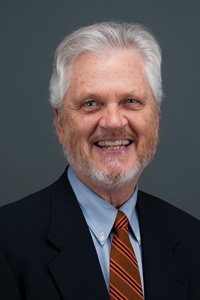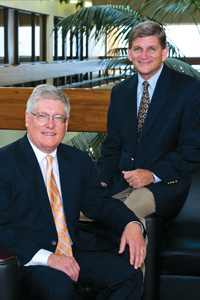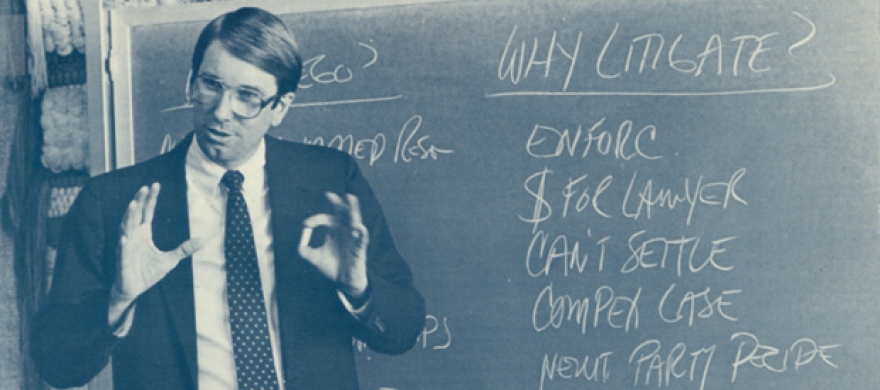The Great and the Just Celebrate 25 Years at Pepperdine
This fall at Waves Weekend the program reached its own landmark age and celebrated 25 years of engaging students in the study of the most seminal works of literature.
Students of the Great Books Colloquium at Pepperdine enjoy a vast scope of literature, from the philosophies of the ancient Greeks to the natural world explored by Darwin, learning about the human experience as seen through the eyes of some of the best writers of the ages. This fall at Waves Weekend the program reached its own landmark age and celebrated 25 years of engaging students in the study of the most seminal works of literature.
Great Books Colloquium 
Michael Gose
“It’s hard for me to believe that it’s been 25 years,” muses the program’s interim director Michael G. Ditmore, who is also director of American studies and professor of English.
The Great Books program was founded at Pepperdine in 1986 by Michael D. Gose, professor of humanities, and Victoria Myers, the Blanche E. Seaver Chair of English Literature, as an integrated series of four courses in which students read and discuss some of the most influential, thought-provoking, and enjoyable books ever written.
“Whatever their majors, ‘my’ alumni write me that the colloquium was instrumental to the development of serious academic intent, reading and thinking critically, and becoming better students in whichever major they chose.” —Michael Gose
Readings encompass literature, philosophy, politics, psychology, science, and religion, with authors ranging from Plato to Nietzsche, from Homer to Dostoyevsky, from Augustine to Freud. Throughout its 25 years, the small classes and lively discussions have solidified the colloquium as a cherished part of the undergraduate experience.
“I think it’s one of the very best things Seaver College has to offer its undergraduates,” says Paul Contino, the Blanche E. Seaver Professor in Humanities. “It’s very important that students read, think about, write about, and discuss the works that have been most formative for civilization.”
The October anniversary celebration honored the special occasion with a great variety of events, particularly the formal opening of the Great Books Room in Payson Library, Malibu. “Virtually all the Great Books faculty were there,” Ditmore notes. The room is dedicated to the Great Books pedagogy, including the collection taught on Pepperdine’s syllabus, and features a grand marble table designed by Ilan Dei of Venice, California.
Other events to celebrate the anniversary included a lecture by Earl Shorris, founder and chair of the advisory board of the Clemente Course in the Humanities. The lecture, titled “The Moral Life of Downtown: Bringing the Humanities to the Poor,” was presented as part of the W. David Baird Distinguished Lecture Series at Seaver College. American comedy troupe the Reduced Shakespeare Company also performed “All the Great Books,” a riotous compact compendium of great literature from Confucius to Tennyson.
Additionally, Gose hosted an alumni symposium titled, “How Have the Great Books Shown Their Significance in Your Life After Graduation?” and Don Marshall, recently retired Fletcher Jones Chair of Great Books, oversaw discussion groups based around readings of Tocqueville’s Democracy in America.
ON THE WEB: Learn more about the Great Books Colloquium: seaver.pepperdine.edu/humanities/programs/greatbooks.htm
Straus Institute for Dispute Resolution 
Tom Stipanowich and Peter Robinson
“When the Straus Institute began its life 25 years ago, it owed much to the sudden emergence of mediation as a tool for settling litigated cases and on the growing market for mediation training among experienced lawyers,” explains Tom Stipanowich, academic director of the Straus Institute, the William H. Webster Chair in Dispute Resolution, and professor of law. “Today, the knowledge and skills imparted by institute courses are at the heart of current U.S. and international law practice.”
Over the years, Straus has offered skills-training materials and academic courses at the School of Law that address the intersection of dispute resolution, religion, apology, and reconciliation. A commitment to faith- based reconciliation has also developed and encouraged training sessions around the world in the management of conflict, the theology of conflict, and biblical reconciliation. As each area has matured, they have together created an internationally recognized program that has topped the U.S. News & World Report rankings as the number one dispute resolution program in the nation for the past seven years.
At the heart of Straus’ educational experience is the faculty, made up of nationally and internationally known scholars engaged in a wide range of scholarship and policymaking. “Pepperdine is fortunate to have developed a ‘critical mass’ of faculty expertise,” adds Stipanowich, who leads the institute along with managing director and associate professor of law Peter Robinson. “Those of us who teach and write here nearly always have one or more people with whom to vet new ideas and discuss current developments in the field.”
The various programs within the Straus Institute have also enhanced the learning process. In particular, the active Dispute Resolution Externship Program has allowed students to translate theory into practice, with enrollment totaling more than 100 externships per year. Students are able to practice and hone their mediation skills at the institute’s Mediation Clinic, which allows them to mediate limited jurisdiction cases for the Los Angeles Superior Court, as well as the Financial Industry Regulatory Authority (FINRA) Investor Advocacy Clinic, where they represent investors in arbitrations and mediations.
“In addition to the great experience learning how to conduct arbitrations through FINRA’s arbitration forum, we learned a significant amount about client interaction, professional responsibility, and arbitration strategy,” recalls student Maxfield Marquardt, a Spring 2011 participant of the Investor Advocacy Clinic.
ON THE WEB: Learn more about the Straus Institute and upcoming anniversary events: straus.pepperdine.edu[BROKEN LINK]
